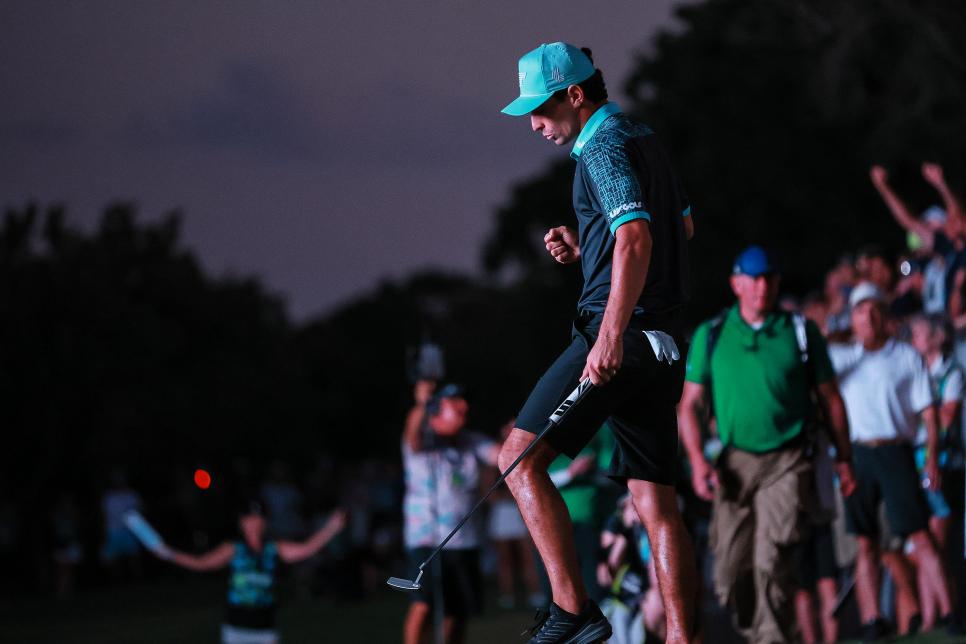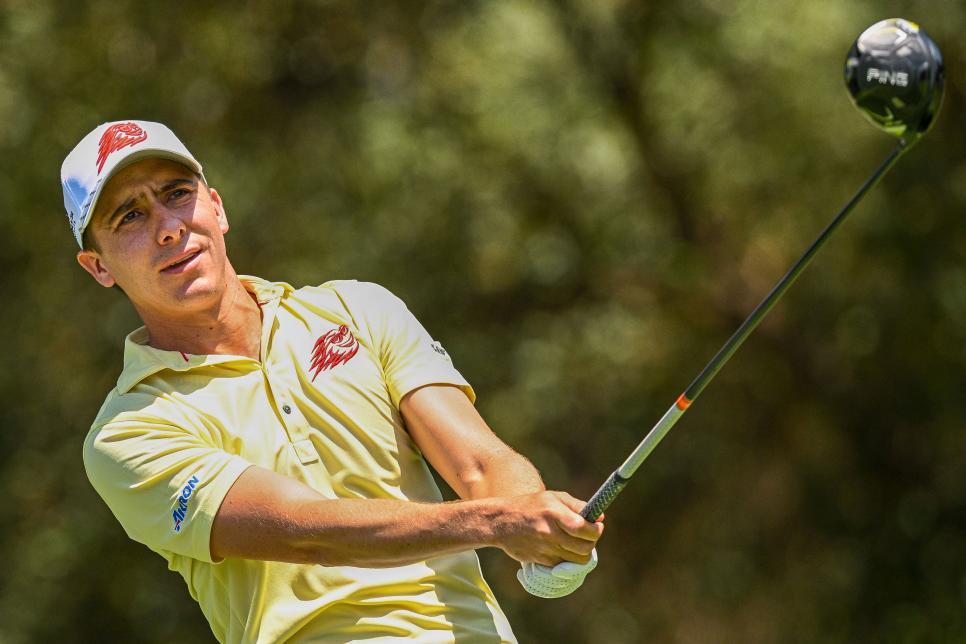[PHOTO: David Cannon]
Irreconcilable dissonance. We’re not exactly sure where we read that play on words, but we are appropriating the term here considering how neatly it describes the current landscape as it relates to one gnawing, intractable issue undermining the legitimacy of the men’s professional golf.
The Official World Golf Ranking no longer accurately reflects the game’s talent structure. With the launch of the LIV Golf League in 2022, a significant segment of players no longer earn points for the majority of events they’re competing in. That includes elite players such as Brooks Koepka, the reigning PGA champion, two-time major winner Dustin Johnson, Bryson DeChambeau, Cam Smith and Jon Rahm, another two-time major winner and the reigning Masters champion whose exit velocity from the PGA Tour in December pulled in Ryder Cup teammate Tyrrell Hatton just before LIV’s season opener in Mexico.
At this week’s Asian Tour International Oman event, more than 20 LIV golfers will be in the field, including Louis Oosthuizen, Peter Uihlein, Matthew Wolff, Abraham Ancer, and Mito Pereira. Given LIV’s partnership with the Asian Tour, some players are contractually obligated to compete – and it works well in their schedules ahead of the LIV Golf event in Saudi Arabia a week later. Others, however, are there to try to help earn OWGR points.
One can make an argument that the OWGR board of directors has an obligation to devise a mathematical formula that awards points for LIV Golf’s 54-hole format as it does for other minor tours. One can also make a counter-argument that LIV’s largely closed-shop roster, small fields and concurrent team competition skew its results to a degree that compels the OWGR to deny certification.
With officials from the PGA Tour and DP World Tour recusing themselves from the decision, the remaining members of the OWGR board denied LIV Golf’s request for inclusion last October. Those remaining members are the representatives of the four major championships.
Presumably this will all be corrected whenever the PGA Tour finalises its negotiations with the Public Investment Fund of Saudi Arabia, the financial muscle behind LIV Golf. Until that happens, however, we’ll continue to monitor the degrees of consternation or schadenfreude certain factions exhibit as they observe LIV golfers slipping down the board and, thus, losing access to the majors via top-50 standing.
Make no mistake, this is the heart of the problem in the short run. Without LIV events getting OWGR points, LIV players’ path into major championships via being among the top 50 (Masters, British Open) or top 60 (US Open) in the rankings is cut off.
It was difficult to not feel a slight pang of sympathy for Joaquin Niemann, who beat Sergio Garcia in a playoff to win LIV Golf Mexico and then lamented that because he no longer resides among the world’s top 50, he wasn’t eligible to compete in any of the majors – though he did qualify for the Open Championship at Royal Troon by virtue of his playoff win at the Australian Open in December. Niemann is playing in Oman this week, too, looking for OWGR points but poised to miss his first Masters since the 2020 pandemic edition.

In the aftermath of his win in the Mexican twilight, Niemann was passionate about his career goals. “I want to win majors, but I gotta get in first.” Well, had winning majors been his priority, he would have remained on the PGA Tour, where he built a résumé that saw him rise to 15th in the world. When he was among the gang of six who defected to LIV after the 2022 Tour Championship, he was ranked 19th, but he has since fallen to 81st.
This is the Faustian bargain that he and his fellow LIV members opted to accept. Their choice made them wildly rich – some more so than others – while taking a calculated risk that their standing in the sport as reflected in the OWGR would not be adversely affected, at least not for long. Some accepted what can only be estimated as generational wealth. It’s a damn good deal. Their omission from the OWGR is not a punishment, but the price of that payday.
Golf fans can and should be unhappy about the current imbalance of the OWGR, but anyone who lays the blame at the feet of OWGR chairman Peter Dawson and representatives of the major championship has a misplaced sense for assigning fault.
LIV golfers are working the hard way to qualify for majors in 2024
Interestingly, it was another LIV golfer who grasped the role he played in his own predicament.
Carlos Ortiz, who has fallen to 1,286th in the world, seems to be of two minds on the subject, telling former tour player and CBS broadcaster Colt Knost on a recent podcast that, “I understand that we went out of the system, and it’s gonna take time to be part of the system. But I also think that if the world ranking was to be accurate, they have to include all kinds of players.”
But the following is why Ortiz deserves a measure of respect: “I’m not saying we should have got them from the beginning, or something. I know there are certain rules, and I knew from the beginning the consequences and the setback that we could have had, and I accept them… I definitely knew the consequences and the reason for going [and] not getting world ranking points was part of them.”

Ortiz [above] did add one strange observation, that people “have to recognise that there [are] good players here [on LIV]”. This is both true and beside the point. Of course there are good players competing on the LIV tour. Some are great. Some are destined for the Hall of Fame. But they also contributed to the very deficiencies in the OWGR that they lament.
Last Sunday at the Malaysian Open, Spain’s David Puig, a member of Garcia’s Fireballs team, offered another reminder of the talent on LIV Golf. Not exactly a household name in golf, Puig completed a remarkable weekend to win his second Asian Tour event in the past four months. He submitted a pair of bogey-free 62s after making the cut on the number, and in the process claimed one of three qualifying spots for The Open like Niemann did in Sydney.
“Getting that Open spot is super cool,” said Puig, who rose from No.245 to 141st in the world after his victory. “I came here for that.”
LIV golfers say they just want to be a part of the OWGR ecosystem. For now, players like Puig and Niemann have to find their way into the existing one wherever they can. It doesn’t seem quite right, but it’s the path they chose for riches beyond their wildest dreams – and, obviously, well beyond their dreams of winning majors.

